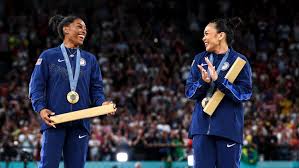
Introduction
The Olympic Games have long been a stage for extraordinary athletic achievements, but recent competitions have seen a remarkable surge in the dominance of women athletes. This trend underscores a broader shift towards gender equality in sports and highlights the incredible performances that have captivated audiences around the world. In this article, we explore how female athletes have increasingly ruled the Olympics, breaking records, shattering stereotypes, and setting new standards of
The Rise of Female Athletic Dominance
Breaking Barriers
Women’s participation in the Olympics has evolved significantly since the early days of the Games. What was once a marginal presence has now transformed into a showcase of world-class talent and unprecedented
- Historical Context: Women’s events were first introduced in the early 20th century, and over time, the scope of female participation has expanded across a diverse range of sports.
- Milestones: Recent Olympics have seen women achieving historic milestones, including more medal events for women and increased representation in traditionally male-dominated sports.
Record-Breaking Performances
Female athletes have not only participated in the Olympics but have also set numerous records, demonstrating their exceptional skill and dedication.
Table of Contents
- Track and Field: Athletes like Florence Griffith-Joyner and Shelly-Ann Fraser-Pryce have set world records in sprints, showcasing unparalleled speed and endurance.
- Swimming: Swimmers such as Katie Ledecky and Simone Manuel have broken world records and won multiple gold medals, highlighting their dominance in the pool.
Highlighting Female Stars of Recent Olympics
Simone Biles: Gymnastics Phenomenon
Simone Biles has emerged as one of the most dominant figures in gymnastics, with performances that have captivated audiences and set new standards in the sport.
- Achievements: Biles has amassed a collection of gold medals and world titles, including a record number of World Championship titles in gymnastics.
- Impact: Her performances have not only earned her accolades but have also sparked conversations about mental health and athlete well-being.
Katie Ledecky: Swimming Sensation
Katie Ledecky has established herself as a powerhouse in competitive swimming, with her performances continuing to break records and set new benchmarks.
- Achievements: Ledecky has won multiple gold medals in freestyle events, setting world records that have redefined the limits of the sport.
- Legacy: Her dominance in the pool has solidified her status as one of the greatest swimmers of all time.
Caster Semenya: Middle-Distance Marvel
Caster Semenya’s achievements in middle-distance running have brought attention to both her athletic prowess and the complex issues surrounding gender and eligibility in sports.
- Achievements: Semenya has won gold medals in the 800 meters and has been a dominant force in middle-distance events.
- Challenges: Her career has also been marked by controversies related to gender testing and regulations, which have sparked debates about fairness and inclusivity.

The Impact of Female Athletes on the Olympics
Promoting Gender Equality
The rise of female athletes in the Olympics has played a crucial role in promoting gender equality in sports and inspiring future generations.
- Visibility: Increased media coverage and visibility of female athletes have helped challenge stereotypes and encourage young women to pursue sports.
- Inspiration: Female athletes serve as role models, demonstrating that women can excel in all areas of competition and achieve greatness on the global stage.
Shifting Sports Dynamics
The dominance of women athletes has also influenced the dynamics of various sports, leading to changes in how events are structured and how athletes are supported.
- Event Expansion: The inclusion of more women’s events and the introduction of mixed-gender competitions reflect the growing recognition of female athletes’ contributions.
- Support Systems: Enhanced support systems, including better training facilities and funding, have contributed to the success of female athletes, allowing them to compete at the highest levels.
Challenges and Continuing Struggles
Inequality and Pay Disparities
Despite significant progress, female athletes still face challenges related to inequality and pay disparities compared to their male counterparts.
- Pay Gaps: Many female athletes continue to earn less than their male counterparts, reflecting broader issues of gender-based pay disparities in sports.
- Sponsorship and Media Coverage: Female athletes often receive less sponsorship and media coverage, which can impact their visibility and financial support.
Navigating Pressures and Expectations
Female athletes frequently navigate additional pressures and expectations, including societal norms and personal challenges.
- Media Scrutiny: Female athletes often face heightened media scrutiny related to their appearance, personal lives, and performance, which can affect their well-being.
- Balancing Roles: Many female athletes juggle their sports careers with other responsibilities, such as family and education, adding to the challenges they face.
Future Prospects
Continued Progress
The future of female athletics in the Olympics looks promising, with continued efforts to address inequalities and support women’s sports.
- Increased Opportunities: Efforts to expand opportunities for female athletes, including more events and better support systems, are expected to contribute to continued success.
- Advocacy and Reform: Ongoing advocacy for gender equality and reforms in sports governance are likely to drive positive changes and further elevate the status of female athletes.
Inspiring the Next Generation
The achievements of current female athletes will inspire the next generation of athletes, encouraging young women to pursue their athletic dreams and challenge the status quo.
- Grassroots Initiatives: Grassroots programs and initiatives aimed at encouraging young women to participate in sports will help build a strong pipeline of future Olympic champions.
- Role Models: Prominent female athletes will continue to serve as role models, motivating young girls to strive for excellence and pursue their passions.
Conclusion
The dominance of female athletes in the Olympics represents a significant and exciting development in the world of sports. With record-breaking performances, increased visibility, and ongoing efforts to promote gender equality, women have firmly established themselves as key players on the Olympic stage. While challenges remain, the progress made by female athletes is a testament to their skill, dedication, and resilience. As we look to the future, the continued success of women in the Olympics promises to inspire and drive further advancements in the world of sports.







